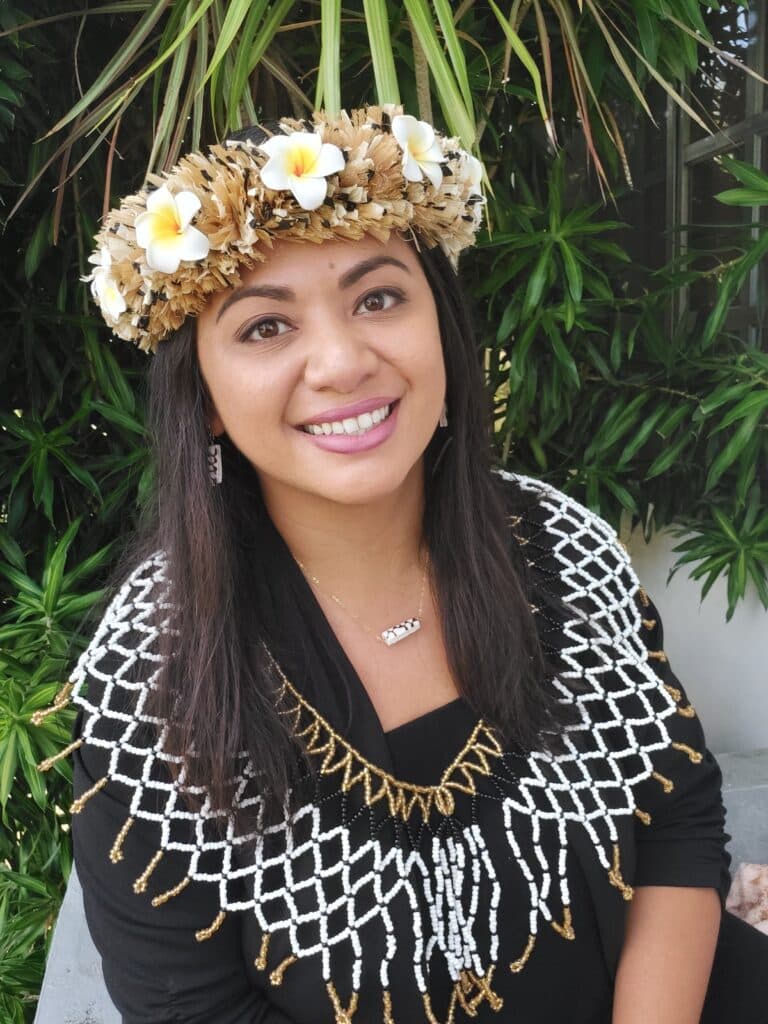
Indigenous Wisdom is Necessary to Win the Climate Fight
Rep. Sheila Therese Babauta (D-Saipan) was born and raised on the island of Saipan in the Mariana Islands, a U.S. territory in the Pacific Ocean. She is currently serving her second term on the 22nd Northern Mariana Legislature in the House of Representatives where she is chairwoman of the House Natural Resources Committee. Rep. Babauta is also the chairwoman of the Friends of the Mariana Trench monument, dedicated to the protection of the monument. In this Q+A for Green 2.0 to mark Asian American and Pacific Islanders month, Rep. Babauta discusses her role introducing President Barack Obama at the recent 2021 United Nations Climate Change Conference and how more Indigenous climate and environmental leaders should be welcomed to the table where policymaking is taking place.
Q: How did you get selected to introduce President Barack Obama at COP26?
Before I got on the plane for the two day journey to Scotland, I authored and published an op-ed, “Why I am going to Glasgow.” In 2019 I was selected as an Obama Asia-Pacific Leader, and my essay was based on the answer President Obama gave me when I asked him a question at our first convening. He told me to “raise awareness, gather allies, and unify our voice.” When I heard the Obama Foundation was going to be at COP26, I shared my essay with them. They liked it so much they asked if I would like to introduce President Obama for his speech at COP.
Q: What was your experience attending COP26?
As a lawmaker representing a small community on a small island that is part of a territory owned by, but not part of the United States, I always talk about the need to have a seat at the table. In the case of COP26, just getting to that table in Scotland was a logistical challenge. I had to take six airplanes and travel over 20,000 miles. I had layovers, flight delays, and cancellations. I was rerouted twice. I had to take numerous COVID-19 tests. COVID-19 created a whole new level of complexity.
Having to overcome all of these physical barriers just to get to Scotland fortified my resolve to have my voice heard. I told myself my mission is to work hard and share our stories. I am going to gather resources to bring home, whether it be connections, relationships, contacts, possible funding sources, or awareness. The voyage there was a huge part of my preparation.
As a member of the Micronesian Climate Change Alliance, the opportunity to attend COP26 was provided to me by the “It Takes Roots Delegation,” which is made up of Indigenous organizations all around the world, but mainly in the United States and the U.S. territories. We organized, marched, and protested. I was no longer Sheila the Chair of the House Committee on Natural Resources, I was Sheila the Indigenous activist.
Sadly the outcome of COP26 was very disappointing. It was almost as if we were not heard. The most positive experience I had, was that I found myself in many spaces where I re-energized my passion for the environment and for our world and that was because I was around other passionate people. They came from different backgrounds and countries which was absolutely amazing and such a wonderful experience to be with other human beings who are very different from me yet we found connection and a commonality. That gave me a lot of hope and that is what I remember most about COP26.
Q: There was a lot of criticism around COP26’s lack of Indigenous representation and inclusion, what do you say about that?
There were more delegates representing the fossil fuel industry than there were Indigenous delegates combined and that is completely unacceptable. The barriers that existed, especially because COP26 happened in the midst of this pandemic, created many challenges for Indigenous leaders to attend. We have to plan and organize months in advance because we have responsibilities back home and we are making that decision to leave our homeland and travel to a space that is unknown. Being in a strange place can feel very threatening– there is real fear.
I believe that the organizers of COP26 and of the United Nations Climate Change Conference can do a better job including Indigenous communities. “COP” stands for “Conference Of the Parties” and we need a party made of Indigenous peoples. And honestly, we need more than one party made up of Indigenous peoples because there are many types of Indigenous people around the world. This is one way that the United Nations can honor the rights of Indigenous peoples- the Declaration. It’s called UNDRIP: United Nations Declaration of Rights for Indigenous Peoples.
Sadly the outcome of COP26 was very disappointing. It was almost as if we were not heard. The most positive experience I had, was that I found myself in many spaces where I re-energized my passion for the environment and for our world and that was because I was around other passionate people.
Q: Can you talk about where you see the climate movement heading and what you believe the goals for COP27 need to be?
Indigenous communities are frontline climate crisis communities. We are going to bear the brunt of the worst effects of climate change. It is clear we are going to have to carry the heaviest conservation burden. But if we are going to be on the front lines, we need to be in the war room at the decision-making table, too. And right now we’re not. Since the Global South and Indigenous communities are going to carry the heaviest conservation burden, the wealthy countries need to agree to carry the heaviest financial burden. We need each other to tackle this crisis, and we have to work together.
Q: Can you talk about the work of the Friends of the Mariana Trench and why this work is so pressing?
I am the Chair of the Friends of the Mariana Trench, an Indigenous-led 501(c)3 conservation organization with a vision to support healthy oceans and healthy communities. We are on a mission to be the guardians of the Mariana Trench and our surrounding ocean resources by empowering communities with conservation strategies and research grounded in traditional teachings. We focus on research, education, and stewardship and we believe that engaging the local community is the answer to ocean conservation across the Marianas and around the world.

To learn more about the Friends of the Mariana Trench, visit www.friendsmarianatrench.org and follow them on Twitter @FriendsTrench. For more information about Rep. Sheila Babauta, visit her Obama Foundation page and follow her on Twitter @sheilababauta.
